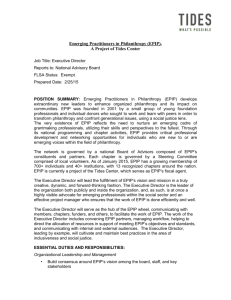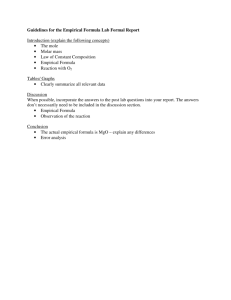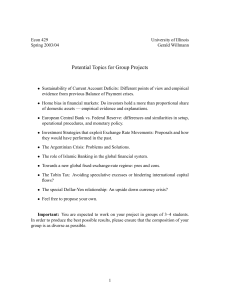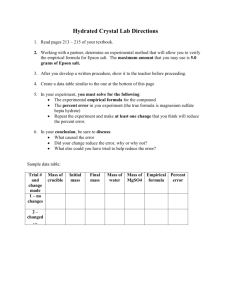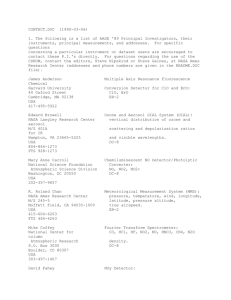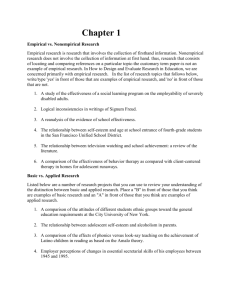EVIDENCE-BASED IP POLICYMAKING: WHAT*S THAT?
advertisement
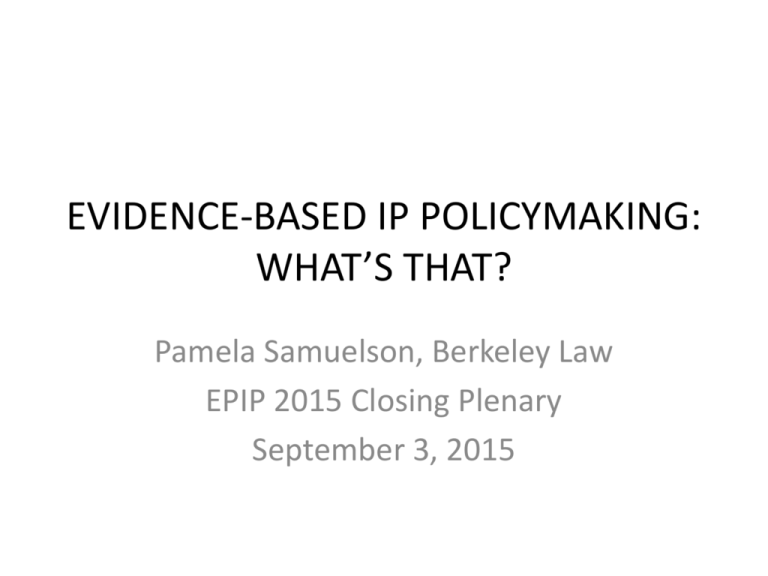
EVIDENCE-BASED IP POLICYMAKING: WHAT’S THAT? Pamela Samuelson, Berkeley Law EPIP 2015 Closing Plenary September 3, 2015 OPENING THOUGHTS • Many thanks to Martin Kretschmer & CREATe team for an outstanding conference • I go to many conferences; rarely do I come away as stimulated as I have been here – Only frustration has been not being able to be at all of the interesting parallel sessions • Some risk for Martin & for me to do a closing plenary more or less on the fly – it’s such a nice day; wouldn’t you be better off outside? • Goal is to reflect on how presentations at the conference have furthered (or not) a research agenda for developing evidence-based IP policy 9/2/2015 EPIP 2015 2 OVERVIEW • Conventional IP policymaking: more based on strength of lobbying efforts by industry groups than on empirical evidence • Why empirical evidence should play a greater role in IP policy-making, especially in © • The rise of various types of empirical studies of IP, even of © • Empirical studies of IP must be translated into policy-relevant recommendations 9/2/2015 EPIP 2015 3 CONVENTIONAL IP POLICYMAKING • Most often driven by proposals from affected industry groups that claim to need more IP protection • Especially true in copyright policymaking – Tell us what you want & we’ll give it to you! – Jessica Litman, Digital Copyright (2001) tells US story • Remarkably little empirical basis to support major policy initiatives in the mid-1990s – Digital networked environments are scary for © owners – Need to control all temporary & permanent copies of works in digital form to be willing to make work available – Need for strong anti-circumvention rules to protect © 9/2/2015 EPIP 2015 4 WIPO © TREATY • Overall, surprisingly balanced (much more than draft treaty debated at diplomatic conference) • But not due to empirical evidence of need for more, less, or different level of © protection • Rather, alignments of common interests among reps of Nordic countries, some developing nations, telecos, & Internet intermediaries who questioned the need for stronger protections being sought by US, EU, major © industry groups 9/2/2015 EPIP 2015 5 INFO-SOC DIRECTIVE & DMCA • Info-Soc Directive less balanced than WCT: – Insistence on © control over temporary copies (even though no empirical evidence that this was needed) – Closed list of acceptable but unharmonized exceptions • Even though harmonization might have been possible • Even though none addressed the need for flexibility in time of rapid technological change, as Hargreaves & Hugenholtz have emphasized – Anti-circumvention rules more onerous than US • DMCA: Anti-circumvention rules least well-balanced part – – – – 9/2/2015 Most exceptions not meaningful Preservation of fair use, other lawful uses debated Reverse notice & takedown regime proposed Triennial rulemaking has provided an opportunity for offering evidence of limits on lawful uses EPIP 2015 6 WHY EVIDENCE IS NEEDED • IP-intensive industries have become ever greater part of GDP & GDP growth, as well as international trade • © no longer backwater where intra-industry bartering is acceptable way to make policy • Political economy problems have been prevalent because of collective action problems (public not easily aroused) • Nations need to promote ongoing innovation, but also competition, to serve the long-term interests of society • Rapid technological change, disrupted markets make © policy more difficult than ever • Hargreaves points out risk for EU of digging itself into “digital black hole,” evidence-based IP may avoid this • Lack of evidence-based IP rules “bad” rules 9/2/2015 EPIP 2015 7 EXAMPLES OF BAD RULES • EU sui generis database protection • Extension of existing copyright terms in US & EU & related rights in sound recordings in EU • Higher statutory damage award levels in US • Stricter secondary liability rules (e.g., “3 strikes” rules to kick file-sharers off Internet) • Overly narrow, restrictive, & unharmonized orphan works legislation in EU 9/2/2015 EPIP 2015 8 EMPIRICAL WORK: what’s that? • Unfamiliar to many in the IP field (though less so at EPIP) • Empirical work provides a more grounded & complete understanding of what’s going on in the world; good idea to understand phenomena before you try to regulate them – Not just anecdotes, not just heated rhetoric • Several methods for doing empirical work: – Surveys of sample of affected population(s) (e.g., Bodo on Dutch media consumption) – Statistical analyses of data sets (e.g., Aguiar & Waldfogel on effects of DSM liberalization, Moser study of citation data) – Structured qualitative interviews with human subjects (e.g., Katzenbach & Van Roessel on imitations in videogames , Silbey on alignment (or not) of IP norms and what creators want) 9/2/2015 EPIP 2015 9 MORE TYPES OF EMPIRICAL WORK • Comparative studies of how different jurisdictions address IP issues (e.g, Favele, et al. study of OW regimes, study of parody exceptions) • Comprehensive analysis of judicial decisions with targeted focus (e.g., Favele, et al., on © decisions of CJEU) • Case studies (e.g., Jones’ study of 3D printing in certain industrial sectors, Wallace on surrogate IP rights of libraries, archives & museums) • Lab experiments (e.g., Bechtold et al. on sequential innovation studies) 9/2/2015 EPIP 2015 10 SOMETIMES EVIDENCE MATTERS • Hargreaves Report gave boost to this approach • US decided vs. sui generis database legislation because of evidence that it was not needed, would cause spillover harms to science, industry • Proposed fashion protection in US not adopted • Liability based on technical design = harmful • Failure of SOPA/PIPA in part because of evidence of spillover harms • Maybe © term extensions won’t happen again 9/2/2015 EPIP 2015 11 HARGREAVES REPORT • Is the current IP regime framework well-designed to promote innovation & economic growth? If not, what needs to change? • Evidence should drive policy • Proposals for change to improve the law: – Better infrastructure for digital licensing of © works – Common code of practices for collecting societies – New exceptions to © for private copying, data mining, adapting to technological change – Orphan works solution 9/2/2015 EPIP 2015 12 OTHER EXAMPLES • Database legislation in the US not needed – Reichman & Samuelson, IP Rights in Data? – Maurer, Hugenholtz, & Onsrud ?d utility of it • Fashion protection: $6 billion industry has flourished without © – Raustiala & Sprigman, Piracy Paradox • Secondary liability of technology developers – Tech co amicus curiae briefs to US SCT in MGM v. Grokster: preserve Sony safe harbor for technologies with substantial noninfringing uses 9/2/2015 EPIP 2015 13 OTHER ISSUES • SOPA/PIPA was fundamentally inconsistent with DNSSEC (DNS Security Extensions), a protocol developed to avoid abusive redirections of Internet traffic, whether by criminals, autocratic governments or other wrongdoers. – Computer security experts spent more than a decade developing DNSSEC, which is now being implemented all over the world, including by U.S. government agencies. • Studies by Heald, among others, shows that cultural stewardship justification for extending © terms unwarranted by evidence – 2018 only a few years away, so will Mickey Mouse finally make it into the public domain or be locked up again? 9/2/2015 EPIP 2015 14 SWAMP OR FIRM GROUND? • Kastenmeier & Remington (1985): proponents of expanded IP rights (such as SCPA) should bear burden of proof that: – New interest can fit harmoniously within existing legal framework without violating fundamental principles – Possible to define the contours of protected subject matter and/or scope of rights with clarity – Honest assessment of whether benefits of proposed legislation outweigh costs (identifying who will lose & why it’s fair that they should bear these losses) – Public domain will be enhanced in due time, & public benefits outweigh proprietary gain 9/2/2015 EPIP 2015 15 EPIP SCHOLARS: WHAT ABOUT? • Expected to hear more at EPIP about— – Empirical studies about barriers to digital single market & how to overcome – Copyright Hub: how well is the new licensing regime working (or not)? – How are well are extended collective licensing regimes working to enable public access to mass digitization projects? – What (if anything) is going to happen after the European Commission’s © reform consultation? • New exceptions? Making available right? – TPMs and anti-circumvention rules as impediments to or facilitators of innovation? 9/2/2015 EPIP 2015 16 ANY RISKS FROM EVIDENCE-BASED IP? • You may need to collaborate with others if you don’t have the methodological skills to do the work alone • Collecting data is not the same having as evidence: – Devil is often in details of interpretation – Be careful in interpreting the data; temptation to construe it to support what you want it to say • No empirical study is without flaws – If you report conclusions that upset some stakeholders, be prepared to be attacked (not fun) • Sample, sample size, biased ?s, “noise” in data, interpretation – Be honest about the limitations of what you know (or can know) from the study you did 9/2/2015 EPIP 2015 17 MORE RISKS • Counter-studies funded by upset stakeholders may reach different conclusions – You’ll have to study their methods & be prepared to challenge their results • Many things we’d like to know about © are difficult to study (e.g., reconceptualizing © exclusive rights) – Hard to study in part because of the highly diverse universe of authors, works, stakeholders, & markets, so generalizations are difficult – In part because no comparably complete registries of © works & ownership cf. patent & TM databases – Waldfogel: some data we’d like is unavailable to researchers • Some values in © realm are not economic (which is what evidence-based IP is mostly focused on) 9/2/2015 EPIP 2015 18 TRANSLATING YOUR WORK TO POLICY • IP scholars tend to conceptualize & frame our work to communicate with each other • That’s all well and good, but if we want to speak to policymakers and have them listen to our recommendations, we need to translate our work so that they perceive its relevance – Publish in venues policymakers might read – Publish in venues in which broader audiences might read • Copyright Grab article in WIRED – Learn to write “2 pagers” – Reach out to policymakers with your recommendations, but remember that they are under different constraints than you are, so be humble but persistent 9/2/2015 EPIP 2015 19 MORE ON TRANSLATIONS • Make things as simple as possible, but no simpler • Communicate in lay terms – No equations (unless you’re talking to one with this kind of expertise) – No insider jargon (how aware are you of how much jargon you routinely use & how to avoid it?) – Social media is a way to build an audience – Julia Reda: build popular support for your ideas • Think about who else (e.g., NGOs) out there cares about the issues in the same way you do & work with them to further your evidence-based policy goals • Next EPIP, convene a panel of policymakers on what evidence they would want to support IP policy proposals 9/2/2015 EPIP 2015 20 CONCLUDING THOUGHTS • EPIP is a great forum for exchanges of ideas – Good mixture of lawyers, economists, other researchers, some industry people, & some policymakers – No forum like it in the US (wish there was) • EPIP is a community whose collective goal is to develop & promulgate ideas that will make the IP system work better to promote the social good • Evidence-based IP policy is a worthy goal – It won’t always win out, but… – It gives the community something useful to debate & discuss as well as to offer to EU policymakers (who are more likely than US policymakers to listen to reason) • Reform is possible; just not easy till generational change 3 Sep 2015 EPIP 2015 21
